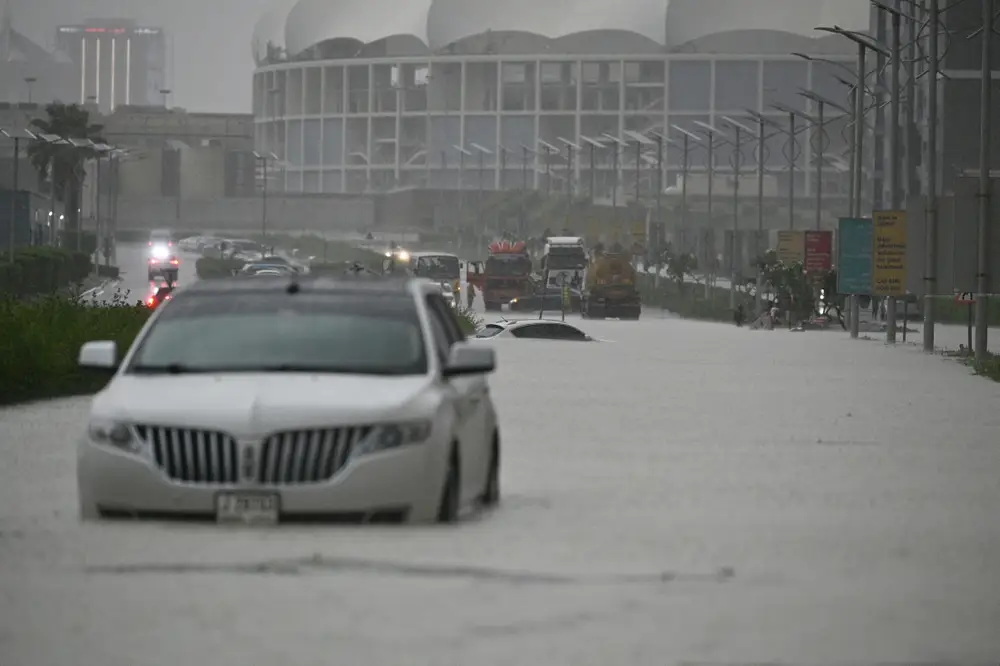Photos show Dubai overwhelmed by torrential rain

Vehicles hardly moved on flooded streets because of heavy rain in Dubai on April 16.
Torrential rainfall pummeled the United Arab Emirates this week, resulting in flash floods that caused air travel chaos, closed schools, and deluged homes.
The rain began late Monday, flooding the UAE with more than half a foot (6.26 inches) of water in 24 hours, according to the Dubai Meteorological Office and cited by ABC News. That is more than two years’ worth of rain in one day, the outlet noted.
There are claims that cloud seeding may have played a role in the flash floods. The practice sees planes inject clouds with chemicals that can increase rainfall. Scientists say it’s unlikely cloud seeding caused the flooding, though.
One fatality was reported by police at the time of writing on Wednesday: A 70-year-old man died in Ras al-Khaimah when his vehicle was swept away in the flooding.
Flooding also occurred in Bahrain, Oman, Qatar, and Saudi Arabia. In Oman, 19 people died in flash floods, according to local media.

Cars engulfed in water on a busy road in Dubai on April 17.
Dubai International Airport — recently named the most luxurious airport in the world — said planes were diverted. Some services now appear to have restarted.
Unverified videos on social media appeared to show heavily flooded tarmac, with large passenger airplanes creating waves and taxiing through several feet of water.
The airport did not immediately respond to a request for comment from B-17 about the videos.

A flooded road in Dubai on April 16.
“We advise you NOT to come to the airport, unless absolutely necessary,” an airport spokesperson wrote on X on Wednesday.
They added that planes continue to be delayed and diverted.
An unnamed couple told the AP that the situation at the airport is “absolute carnage,” with some passengers sleeping there or at the Metro station.

An empty car on a flooded street on April 17.
Dubai recieved more than 5.6 inches of rain by Tuesday evening, around the amount it typically gets in a year and a half, according to Sky News.
It marks its heaviest rainfall in 75 years, according to a WAM news agency cited by Sky News.
In a post shared on X, the UAE’s National Centre of Meteorology showed the regions that have been most affected.
كميات الأمطار التراكمية
للحالة الجوية على الدولة من الأحد 14 إلى صباح الأربعاء 17 أبريل 2024
Total Cumulative rainfall for the weather situation from Sunday, April 14 to Wednesday morning, April 17, 2024. pic.twitter.com/LyM6uqygs5
— المركز الوطني للأرصاد (@ncmuae) April 17, 2024
The UAE has been cloud seeding since the ’90s
While images of extreme flooding can show the consequences of the climate crisis, this particular event may have been worsened by a direct attempt to play rainmaker — literally.
To address water scarcity in the typically dry country, the UAE started using a practice referred to as cloud seeding in the 90s and early 2000s.
Cloud seeding is a method designed to increase the amount of water that falls from a cloud. It involves identifying suitable clouds and then using aircraft or ground-based generators to introduce a chemical agent that facilitates the production of snowflakes.
Cloud seeding has been used in countries worldwide, including in western US states dealing with drought, like California, Colorado, Nevada, Idaho, and Texas.

Vehicles stranded on a flooded street in April following torrential rain in Dubai.
The practice has long been controversial, with critics dismissing it as an attempt to “play God” or being potentially harmful to the environment or public health. Scientists have not documented the harmful impacts of cloud seeding, and recent studies have suggested that the practice works.
Ahmed Habib, a specialist meteorologist, told Bloomberg that the UAE’s cloud seeding operations contributed directly to the heavy rainfall that fell this week.

A car in Dubai is trapped by the heavy rainfall on April 16.
Habib told the outlet that two planes conducted cloud seeding operations on Monday and Tuesday and that seven seeding missions had been carried out in two days.
Flight-tracking data analyzed by the AP suggested that an aircraft affiliated with the UAE’s cloud-seeding project flew around the country Sunday.
“For any cloud that’s suitable over the UAE you make the operation,” Habib told Bloomberg.

A submerged duty machine seen after heavy rain in the United Arab Emirates.
The UAE’s weather bureau said no cloud seeding had taken place during Tuesday’s rain, according to the National News. It did not immediately respond to a request by B-17 for comment.
Chris England, a weather producer at Sky News, said he didn’t believe cloud seeding to be a reason behind the floods, adding that evidence of it working was “pretty slim at best.” Tomer Burg, an atmospheric-science researcher, told the Associated Press that days before the downpour, computer models forecast several inches of rain.
“When we talk about heavy rainfall, we need to talk about climate change. Focusing on cloud seeding is misleading,” an Imperial College of London climate scientist, Friederike Otto, told the AP. “Rainfall is becoming much heavier around the world as the climate warms because a warmer atmosphere can hold more moisture.”
Despite warning citizens to remain home during the heavy rain, the UAE government’s press office said they were “rains of goodness,” as the country has dealt with a rise in heat-related illnesses and deaths that some hope can be alleviated by an increase in rainfall.
Schools across the UAE continued to be closed on Wednesday, and employees are working from home, according to the Sky News report.






